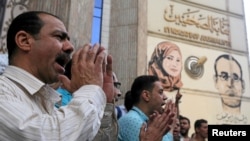Egypt deported a French journalist without explanation on Wednesday, the reporter and his newspaper said, the latest move in an ongoing crackdown by President Abdel-Fattah el-Sissi's government on freedom of expression and the media.
The reporter, Remy Pigaglio, who worked for several publications including Catholic daily La Croix since 2014, was returning from vacation in France and prevented from entering Egypt on Tuesday. Pigaglio said he has a residency work permit and a press card, and was detained for 30 hours at the Cairo International Airport before being sent back to Paris.
Authorities twice inspected photos on Pigaglio's mobile phone, confiscated his passport, and barred him from speaking with embassy officials and family until Tuesday evening, his newspaper said. He was held overnight in a cell at the airport.
The French ambassador to Cairo tried to intervene on his behalf but did not manage to prevent the deportation, and is urging Egyptian authorities to reconsider their decision, France's Foreign Ministry said in a statement.
In Paris, Foreign Minister Jean-Marc Ayrault told reporters after a Cabinet meeting that he protested the move, calling his Egyptian counterpart and telling him he "couldn't remain indifferent to a situation that infringes the freedom of the press."
Pigaglio told his newspaper just before departing on a plane that nothing was confiscated from him and that he wasn't treated badly. "I was not interrogated, and I never knew, and still do not know, why this decision was made to ban me from entering the territory," he said.
French journalists in Egypt demanded an explanation, saying in a note that the deportation was a sign of "authorities' growing repression of Egyptian and foreign media: surveillance, arrest, expulsion and detention."
Journalists have been regularly detained, jailed, and prosecuted under the rule of el-Sissi, who led the 2013 military overthrow of Mohamed Morsi, Egypt's first freely elected civilian president. Foreigners working in a variety of fields have been denied entry to Egypt without explanation.
Egypt was ranked 158 out of 180 countries in the 2015 Press Freedom Index, according to Reporters Without Borders, a freedom of expression advocacy group. In December, the Committee to Protect Journalists said Egypt was second only to China as the world's worst jailer of journalists in 2015.
In an unrelated development, defense lawyers said a Cairo appeals court quashed five-year prison terms handed down on May 14 against 47 anti-government protesters convicted of breaking a law that effectively bans street demonstrations.
However, they said the court upheld the lower tribunal's decision to slap a fine of 100,000 pounds (about 10,000 dollars) on each of the 47 protesters. The appeals court verdict was passed late Tuesday.
The 47 were among a total of 152 protesters convicted on May 14 of breaking the demonstrations law during protests on April 25 against the government's decision to hand over control of two Red Sea islands to Saudi Arabia. The 152 were sentenced to prison terms ranging from two to five years; many were tried in absentia.
Earlier this month, a new draft bill was submitted to Egypt's parliament on regulating the media.
Journalists say it would likely bring the demise of dozens of low-budget, online media outlets serving as refuge for young writers and liberal activists escaping government restrictions on freedom of expression. Awaiting approval by a parliament dominated by el-Sissi loyalists, lawmakers are also set to approve clauses that would ban all live video transmissions without permits. Insiders expect such permits will be denied to non-state media.
European Union member states broadly back el-Sissi and continue to sell Egypt sophisticated weaponry under the rationale that the country needs the firepower to fight a growing insurgency by Islamic militants in the Sinai Peninsula. Egypt, they argue, remains a bulwark of stability in a volatile Middle East.
But el-Sissi's harsh crackdown on critics has left thousands jailed and fanned doubts over his leadership, with many nations voicing concerns.
Close partner Italy has been particularly critical after an Italian doctoral student was found tortured to death after disappearing on Jan. 25, a day that saw a massive police presence in Cairo, prompting accusations that Egypt's security services were involved.
Italy has withdrawn its ambassador to Cairo over the case of Giulio Regeni and said Egypt was not being sufficiently cooperative in the investigation. Egypt denies its security services were involved in Regeni's killing.




